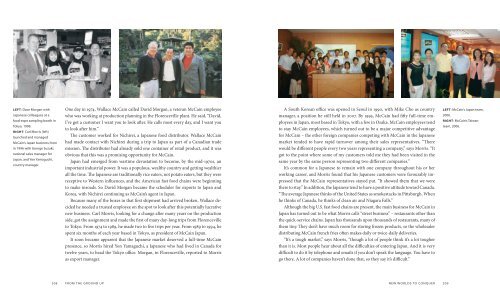From the Ground Up - McCain Foods Limited
From the Ground Up - McCain Foods Limited
From the Ground Up - McCain Foods Limited
Create successful ePaper yourself
Turn your PDF publications into a flip-book with our unique Google optimized e-Paper software.
lEFt: Dave Morgan with<br />
Japanese colleagues at a<br />
food expo sampling booth in<br />
Tokyo, 1998.<br />
RIGHt: Carl Morris (left)<br />
launched and managed<br />
<strong>McCain</strong>’s Japan business; here<br />
in 1996 with George Suzuki,<br />
national sales manager for<br />
Japan, and Yon Yamaguchi,<br />
country manager.<br />
One day in 1974, Wallace <strong>McCain</strong> called David Morgan, a veteran <strong>McCain</strong> employee<br />
who was working at production planning in <strong>the</strong> Florenceville plant. He said, “David,<br />
I’ve got a customer I want you to look after. He calls most every day, and I want you<br />
to look after him.”<br />
The customer worked for Nichirei, a Japanese food distributor. Wallace <strong>McCain</strong><br />
had made contact with Nichirei during a trip to Japan as part of a Canadian trade<br />
mission. The distributor had already sold one container of retail product, and it was<br />
obvious that this was a promising opportunity for <strong>McCain</strong>.<br />
Japan had emerged from wartime devastation to become, by <strong>the</strong> mid-1970s, an<br />
important industrial power. It was a populous, wealthy country and getting wealthier<br />
all <strong>the</strong> time. The Japanese are traditionally rice eaters, not potato eaters, but <strong>the</strong>y were<br />
receptive to Western influences, and <strong>the</strong> American fast food chains were beginning<br />
to make inroads. So David Morgan became <strong>the</strong> scheduler for exports to Japan and<br />
Korea, with Nichirei continuing as <strong>McCain</strong>’s agent in Japan.<br />
Because many of <strong>the</strong> boxes in that first shipment had arrived broken, Wallace decided<br />
he needed a trusted employee on <strong>the</strong> spot to look after this potentially lucrative<br />
new business. Carl Morris, looking for a change after many years on <strong>the</strong> production<br />
side, got <strong>the</strong> assignment and made <strong>the</strong> first of many day-long trips from Florenceville<br />
to Tokyo. <strong>From</strong> 1974 to 1989, he made two to five trips per year. <strong>From</strong> 1989 to 1994, he<br />
spent six months of each year based in Tokyo, as president of <strong>McCain</strong> Japan.<br />
It soon became apparent that <strong>the</strong> Japanese market deserved a full-time <strong>McCain</strong><br />
presence, so Morris hired Yon Yamaguchi, a Japanese who had lived in Canada for<br />
twelve years, to head <strong>the</strong> Tokyo office. Morgan, in Florenceville, reported to Morris<br />
as export manager.<br />
A South Korean office was opened in Seoul in 1990, with Mike Cho as country<br />
manager, a position he still held in 2007. By 1995, <strong>McCain</strong> had fifty full-time employees<br />
in Japan, most based in Tokyo, with a few in Osaka. <strong>McCain</strong> employees tend<br />
to stay <strong>McCain</strong> employees, which turned out to be a major competitive advantage<br />
for <strong>McCain</strong> – <strong>the</strong> o<strong>the</strong>r foreign companies competing with <strong>McCain</strong> in <strong>the</strong> Japanese<br />
market tended to have rapid turnover among <strong>the</strong>ir sales representatives. “There<br />
would be different people every two years representing a company,” says Morris. “It<br />
got to <strong>the</strong> point where some of my customers told me <strong>the</strong>y had been visited in <strong>the</strong><br />
same year by <strong>the</strong> same person representing two different companies.”<br />
It’s common for a Japanese to remain with one company throughout his or her<br />
working career, and Morris found that his Japanese customers were favourably impressed<br />
that <strong>the</strong> <strong>McCain</strong> representatives stayed put. “It showed <strong>the</strong>m that we were<br />
<strong>the</strong>re to stay.” In addition, <strong>the</strong> Japanese tend to have a positive attitude toward Canada.<br />
“The average Japanese thinks of <strong>the</strong> United States as smokestacks in Pittsburgh. When<br />
he thinks of Canada, he thinks of clean air and Niagara Falls.”<br />
Although <strong>the</strong> big U.S. fast food chains are present, <strong>the</strong> main business for <strong>McCain</strong> in<br />
Japan has turned out to be what Morris calls “street business” – restaurants o<strong>the</strong>r than<br />
<strong>the</strong> quick-service chains. Japan has thousands upon thousands of restaurants, many of<br />
<strong>the</strong>m tiny. They don’t have much room for storing frozen products, so <strong>the</strong> wholesaler<br />
distributing <strong>McCain</strong> french fries often makes daily or twice-daily deliveries.<br />
“It’s a tough market,” says Morris, “though a lot of people think it’s a lot tougher<br />
than it is. Most people hear about all <strong>the</strong> difficulties of entering Japan. And it is very<br />
difficult to do it by telephone and emails if you don’t speak <strong>the</strong> language. You have to<br />
go <strong>the</strong>re. A lot of companies haven’t done that, so <strong>the</strong>y say it’s difficult.”<br />
208 <strong>From</strong> <strong>the</strong> GrouN d up<br />
New w orlds to CoN quer 209<br />
lEFt: <strong>McCain</strong>’s Japan team,<br />
2006.<br />
RIGHt: <strong>McCain</strong>’s Taiwan<br />
team, 2006.






